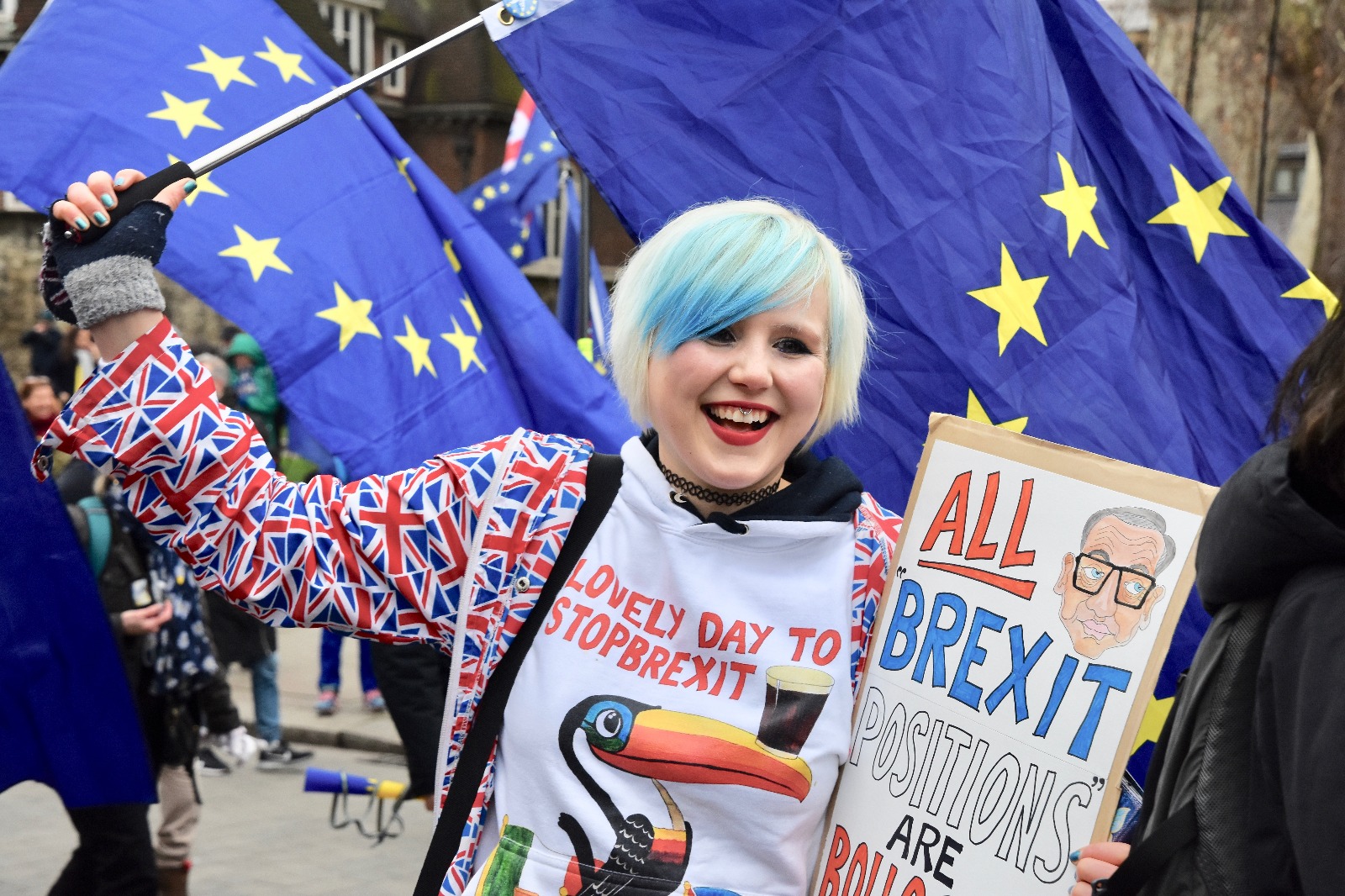
Photo by Michael Melia
Interview by Aurélien Pommier, EST President
We heard a lot about Brexit since 2016, and especially the past few days with the several votes in the House of Commons and the uncertainty about the fate of the UK’s withdrawal from the European Union. Today, the European Student Think Tank presents you the Brexit debate from another angle with this interview of Madeleina Key, also known as: EU Super Girl.
Who is the “EU Supergirl”?
I am the “EU supergirl”, but it is only part of my personality! It is a character I have created to narrativise my campaign to promote the European Union and fight against Brexit and populism. The superhero narrative is something people of all ages can relate to and easily understand. The iconography of the superhero logo is instantly recognisable and therefore engages attention. It’s a compelling storyline that is both engaging and inspirational, to target the apathetic and motivate them to take action for our cause. I dress up in a variety of bold, attention-grabbing costumes, including; supergirl, wonder-woman, a policewoman, a warrior princess, amongst others; which are all customised to present a specific campaign message. The intent is serious, but the approach is not; it’s light-hearted, fun, passionate, compelling and entertaining. It’s about achieving an effective means to communicate, specifically targeted at those who typically find politics boring or who are an unspecialised audience including the youth. It’s also about providing a relatable role-model to inspire others to take action, illustrating concrete examples of activities they can participate in such as; making placards, customising clothing with political messages, writing songs/poetry and performing them at open mic nights/protest events, putting up posters, leafleting and engaging with the public at street stalls. When so many people feel helpless and unable to influence change – the EU supergirl is about self-empowerment and leadership.
You described yourself as a “professional troublemaker” and spend the past few years actively fighting against Brexit, what were your main motivations to take these actions?
Nobody told me to campaign against Brexit, it’s something that has happened over time because I followed my heart and did what I believed to be the right thing to do. Likewise, nobody taught me to be an activist, I’ve tried lots of different actions, worked with lots of people and groups, made mistakes and had successes on the way and learnt from my experiences. My style of campaigning is a reflection on the activities that had the greatest impact combined with what I believe is lacking from the political debate. I call it “professional trouble-making”, it’s about shaking up the system, challenging authorities and holding politicians to account, taking an alternative approach to political campaigning to make the debate more inclusive and diverse, targeting a much wider audience than typically participants. It’s crucial that we reach those people because ignorance and apathy are two key factors which have facilitated to Brexit. I myself was ignorant to much of the great work of the European Union when I voted to remain in it. This was why I was not engaged enough to actively campaign during the referendum, although I was aware of the value of ERASMUS+ and research funding for academic institutions. Since the Brexit vote I have learned so much more about what the EU does to benefit the lives of its citizens, and the more I find out about the damage Brexit will cause to the UK and the harm it will do to the British public – the more determined I have become to fight it. When I discovered the illegalities of the Leave Campaign during the referendum and the lies that were used to deceive ordinary people into voting for something that will ultimately harm them and cause suffering in the already deprived areas of the UK, I also became motivated by a sense of injustice – I am angry at the politicians who have let all of us down, regardless of how we voted.
What do you think of the place of the youth in the public debate in the United-Kingdom?
I think the youth do not have enough prominence in the political debate, which is currently dominated by older, white, male career-politicians often from elite backgrounds. I think the politicians take themselves too seriously, they are the elite and it is very difficult for ordinary people and the youth to relate to them. So they refrain in participating in the debate and having their say. Unfortunately, that means that the interests of young people are not represented in Parliament and do not have enough prominence on the political agenda – young people aged 18-24 voted 75% to Remain in the EU; “our voices are not being heard”! If we achieve a second referendum, or if Brexit occurs and the campaign to rejoin the EU begins; it’s imperative that the youth lead that campaign to remain/rejoin – whichever it is.
Which aims do you hope to achieve through your actions?
Well, obviously my most urgent aim is to stop Brexit! Failing that though, I will be campaigning for Britain to rejoin the European Union through a positive and informative campaign about the benefits of membership. The Remain campaign in the UK lost because it failed to communicate a positive narrative about the EU – that dialogue is sadly, still missing from our public debate. Regardless of what happens with Brexit, there is a huge amount of work to do to educate and change the public perception of the EU in the UK. I also think there is a need for this work across the EU member states because citizen engagement and understanding can be improved and voter turn-out increased through these actions. Ultimately, I hope to widen the political debate about the EU, to make it more accessible and diverse, more engaging easier to understand and more positive.
You wrote a book called “24 Reasons To Remain”, why the United Kingdom should remain a member of the European Union, could you share with us your favourite reasons?
The first and most important reason is ‘Peace’ because the fact that nations can now sit around a table and diplomatically solve conflict through dialogue, decision making and co-operation rather than killing each other – is unquestionably the greatest achievement of the European Union. It’s also the greatest threat posed by Brexit, especially if we see a hard border in Ireland. There is a very real threat of the new IRA, which has weapons stocks buried along the border and seeing a return to the troubles in Ireland. And if one person dies as a result of Brexit – it’s not a price worth paying.
My favourite illustration to draw was probably the last reason – the selfish, but pragmatic reason to remain – ‘prosperity’. It’s also an allusion to the “Magic Money Tree” so often retorted in UK politics – because the truth is that we are far more prosperous as a member state of the European Union and the economic benefits of access to the Single Market repay more than the cost of EU membership.
Now the million-dollar question, what is in your opinion the next step for Brexit: a no deal, the revocation of article 50, a People’s vote, or something else?
I’m open-minded to any means of stopping Brexit – because no kind of Brexit is in the national interest – but I think, democratically, it’s necessary to see another vote. We would have to request an extension to Article 50, of probably 6 months, participate in the EU parliamentary elections (an opportunity to show pro-EU sentiment and vote out the UKIP MEPs) and then in the early Autumn, put the Brexit question back to the British people. The question would have to be binary ’Remain’ or the Brexit option determined by the UK parliament – which is either Theresa May’s deal or no deal. It will undoubtedly be a long, slow, painful process, much like the last 3 years. But if we allow Brexit to go ahead – especially a no deal Brexit – the pain will be far greater, permanent and cause the greatest damage to those already suffering the most in deprived regional areas. Brexit is an injustice; I won’t stand by and allow it to occur without putting up a fight!

 The geopolitical role of the Sahel: the influence of the EU and other Great Powers in the Malian crisis
The geopolitical role of the Sahel: the influence of the EU and other Great Powers in the Malian crisis  Is Nuclear Disarmament Still a Dream? The Third Meeting of State Parties in Perspective
Is Nuclear Disarmament Still a Dream? The Third Meeting of State Parties in Perspective  Strategic Saboteur: Hungary’s Entrenched Illiberalism and the Fracturing of EU Cohesion
Strategic Saboteur: Hungary’s Entrenched Illiberalism and the Fracturing of EU Cohesion  The invention of development: power, narrative, and the afterlife of Truman’s speech
The invention of development: power, narrative, and the afterlife of Truman’s speech 

